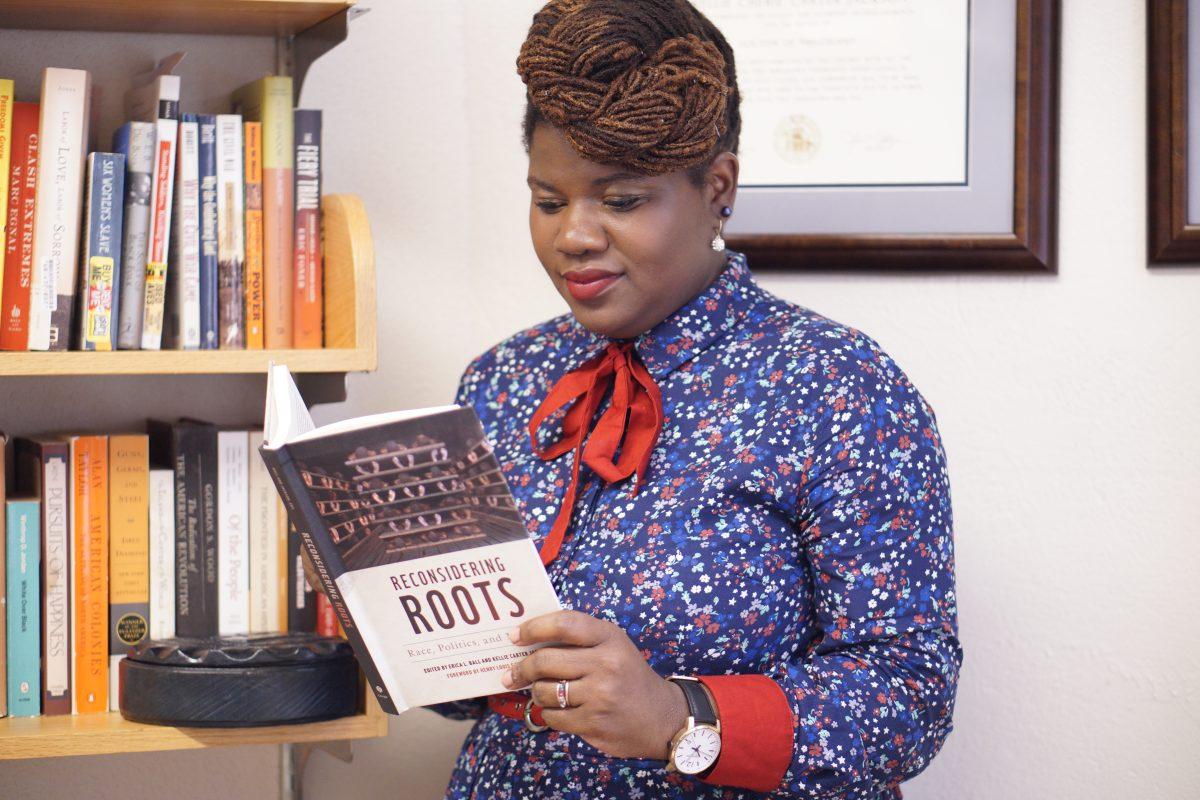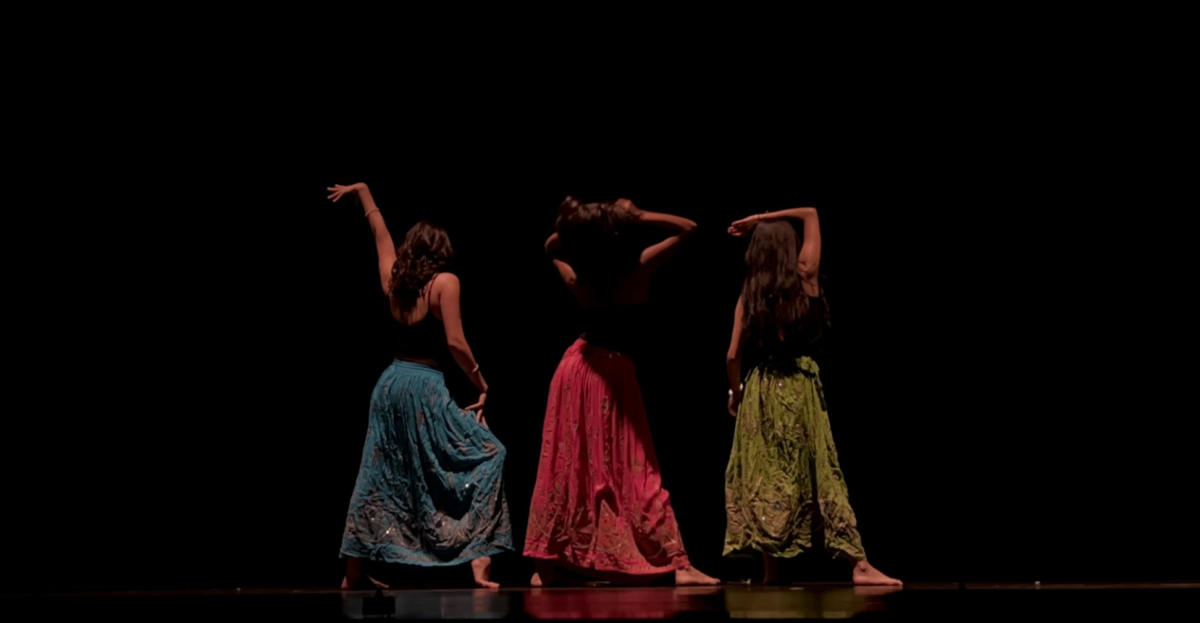Earlier this year, Professor Kellie Carter Jackson and her co-editor Erica Ball published a book entitled “Reconsidering Roots: Race, Politics and Memory,” in which they reexamined Alex Haley’s book “Roots” and the television mini-series of the same name. Carter Jackson stated that she and Ball had always wanted to collaborate on a project, so when Ball suggested revisiting “Roots” in wake of its 40th anniversary and its 2016 remake, that desire to collaborate finally came to fruition. The book takes an analytical look at both the praises and critiques of “Roots” and how this narrative maps on to race relations today.
The original “Roots” television mini-series, which premiered in 1977, was a cultural phenomenon the likes of which America had never seen. The story traces the experiences of a man named Kunta Kinte and his descendants, starting from when Kinte was kidnapped from his West African village and sold into slavery and ending with his descendants’ attainment of freedom after the Civil War. The narrative concludes with a voiceover of “Roots” author Haley explaining that this is the story of his ancestors.
The eight part TV mini-series was first broadcast on eight consecutive nights, a choice that network producers made in an attempt to minimize the drop in ratings they were sure would follow. However, by the end of those eight nights, almost half of America’s population had seen at least one episode, and about 90 million viewers tuned into the finale. The incredible success of the mini- series fueled sales of Haley’s book, putting it on the best- seller list for 46 weeks. To this day, “Roots” has sold more copies than any other African-American author’s narrative.
Despite the incredible success of “Roots,” there are also major controversies which made it the “dirty little secret that academics won’t touch,” as Carter Jackson said. Haley was considered lowbrow: he wrote for Playboy, he was constantly in financial trouble and looking for ways to make money and it was later revealed that he had plagiarized large parts of “Roots.”
“A lot of black academics felt betrayed,” said Carter Jackson. When “Roots” came out, academics all across the country were just starting to get their own Africana studies programs off the ground, and this plagiarism scandal delivered a blow to their legitimacy.
The full title of Haley’s book is “Roots: the Saga of an American Family” and, as the title implies, Haley really did intend to make this a story that could connect to all Americans.
“He framed it as an immigrant’s story… that’s not the true narrative at all, but he knew it was a powerful one that would resonate with a lot of people,” explained Carter Jackson. And indeed the story did resonate with many ethnic American viewers who felt disconnected from their heritage but also not fully accepted by their new country.
Haley made “Roots” a classic “bootstrapper” story, as Carter Jackson said in her speech at the Africana Studies Colloquium in Harambee House this past Thursday. She also explained that viewers came away with a “warm fuzzy feeling” after watching “Roots.” The problem with this was that it discounted the struggles and the inhumanity enslaved people faced. It also gave the illusion that all the problems surrounding race and racism were in the past.
“If you just praise ‘Roots’ for being wonderful, you miss a lot, and if you just focus on what’s problematic. you also miss a great deal,” said Carter Jackson. “ ‘Roots’ meant so much to so many people. I mean you have to understand that in a lot of households, a copy of the book was placed right next to the Bible on family coffee tables. I can vouch for this because that’s what it was like when I was growing up.”
Carter Jackson discussed the complexities of crafting an analytical critique of a narrative that is held so close to the hearts of so many people.
“If you talk to people of a certain age, everyone has a “Roots” memory,” she said. “Everyone wanted to share their “Roots” memory with us… because of all of the emotion surrounding ‘Roots,’ one of the biggest questions we had to answer when we were putting this book together [was], how do you talk about why people loved it and why it was transformative; how do you give it that value, and at the same time be critical of it, and engage with it, and deconstruct it?”
To answer this question, Carter Jackson and Ball put together a call for papers from scholars from all across the country.
“I was amazed by the international impact of ‘Roots’ in countries like South Africa, Pakistan, Canada, Australia and Taiwan… but that’s the power of ‘Roots’: it translates into so many different things for so many different people,” said Carter Jackson.
In spite of the expansive audience “Roots” reached, it did very little to affect the conversations and policy surrounding slavery and race relations because of its bootstrapper narrative and “happy ending.” Carter Jackson compared watching “Roots” to having one good meal, saying that people remembered it and enjoyed experiencing it, but in aggregate they still went to sleep and got up the next morning and went about their lives unchanged.
In this modern political climate and in the wake of the much more violent 2016 “Roots” remake, Carter Jackson analyzed that in the media and in the minds of the American people, there exists “a sanctity afforded to dead white bodies that is not afforded to black bodies.”
She explained that while it is important to understand the extent to which violence was inflicted on slaves and how it is inflicted on black people today, Americans seem to be accustomed to gazing at images of brutalized black bodies. Looking forward, Carter Jackson plans to continue to explore the white gaze on violence against black bodies in her articles and in her upcoming book about black militant abolitionists entitled “Force and Freedom.”
Carter Jackson describes her book “Reconsidering Roots” as a labor of love, and she acknowledges her co- editor, friend, collogue and mentor Erica L. Ball for her vision, wisdom and guidance.
Carter Jackson hopes that this book will lead to more conversations about “Roots” and the current state of race relations in this country.
“I hope readers walk away wanting to add more to the conversation. If this book helps generate another book, or another article or another conversation beyond this book than I would feel that I had done my job… I hope it is a starting point, not a finish line,” she said.





